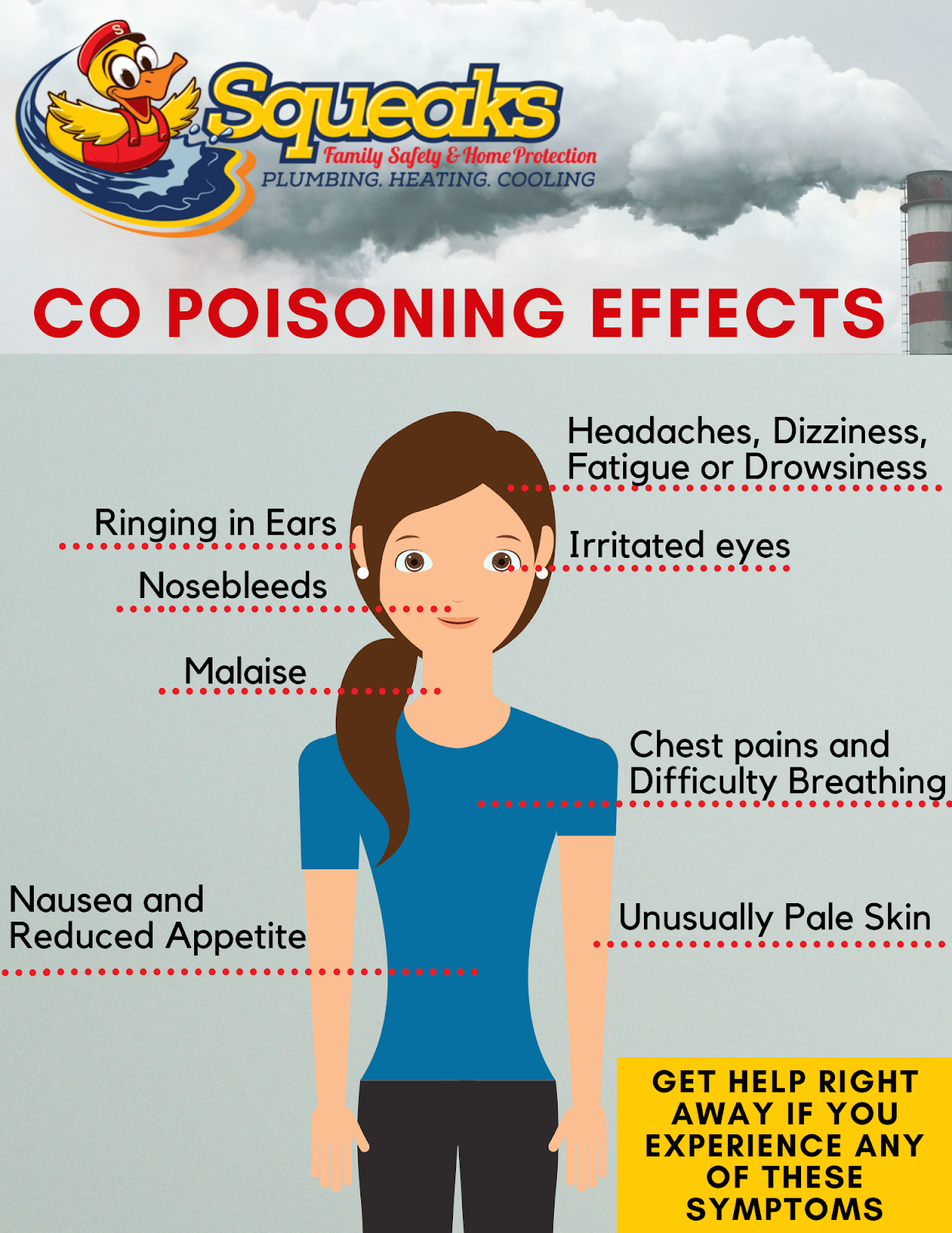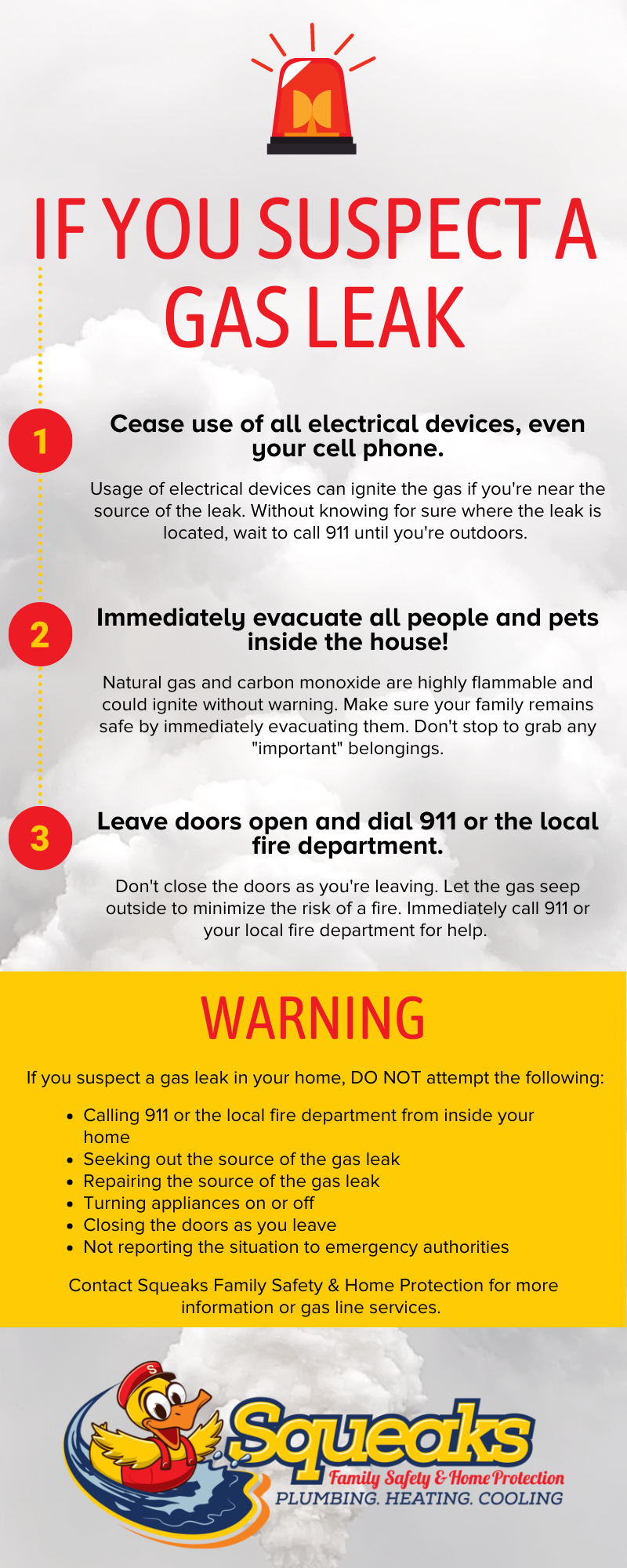How Dangerous is a Gas Leak?
The American Gas Association reports that 189 million households and businesses use natural gas (as of 2024). When installed and used properly, natural gas is safe and convenient. However, gas leaks can lead to serious dangers, including carbon monoxide poisoning in humans and pets. Additionally, natural gas is highly flammable, significantly increasing the risk of fire or explosion if a leak occurs.
You may have heard about the hazards of gas leaks, but how serious are they? At Squeak’s Plumbing, Heating & Air, we’re known for kitchen and bathroom plumbing repairs in and around the Denver area. However, our primary focus is ensuring the safety and comfort of our local community. That’s why we’ve created this helpful guide to emphasize the risks, effects, and signs of gas leaks in your home.
Common Symptoms of a Gas Leak
To prevent the severe consequences of carbon monoxide poisoning, schedule regular maintenance for your furnace and gas-powered appliances. If a leak occurs, watch for these warning signs:
- A gas or rotten egg smell upon entering your home
- Houseplants wilting unusually fast
- A sudden spike in your gas bill
Will You Smell a Gas Leak?
Without professional assistance, gas leaks are nearly undetectable. To enhance safety, utility companies add mercaptan, a harmless chemical that gives natural gas a distinctive rotten egg or sulfur odor, alerting homeowners to potential leaks.
How to Check for a Gas Leak
Suspect a gas leak but unsure? Inspect your natural gas line for visible damage, which could indicate a leak. Gases like carbon monoxide require an airtight seal to be contained, so any damage is a red flag. Even if the line appears intact, use your senses to identify issues:
- Do you notice a hazy gas cloud near the gas line?
- Do you hear a faint hissing sound?
- Do you smell sulfur or rotten eggs?
These are clear signs of a potential gas leak.
Steps to Take if You Suspect a Gas Leak
If you detect or suspect a gas leak in your home, evacuate immediately for safety. Gather all occupants, including pets, and move to a secure location outside. Avoid actions that could cause a spark, such as flipping switches on or off.
Once everyone is safely outside, contact your gas utility company. If you can’t reach them, dial 911. After the leak is resolved, reach out to Squeak’s Plumbing, Heating & Air for professional carbon monoxide inspection and any necessary gas line repairs or replacements.
10 Natural Gas Safety Tips
Gas leaks can cause severe health risks or even death if not addressed properly. Follow these ten safety tips:
- Learn the key signs of a gas leak, including smell, sound, and visual cues.
- Regularly inspect all natural gas appliances and devices.
- Use gas appliances only for their intended purpose (e.g., avoid using a stove to heat a room).
- Maintain your gas system and appliances to ensure optimal performance.
- Keep children away from open natural gas sources.
- Install natural gas and carbon monoxide detectors in your home.
- Learn how to safely shut off your home’s natural gas supply.
- Schedule an annual gas safety inspection to detect hidden leaks.
- Hire Gas Safe registered engineers for installation and maintenance.
- Ensure proper ventilation for gas appliances to support safe combustion.
Natural Gas vs. Carbon Monoxide
Carbon monoxide (CO) is produced by incomplete combustion from appliances like furnaces, water heaters, or poorly maintained ovens and stoves. As a colorless, odorless gas, CO is extremely dangerous, potentially causing asphyxiation or death when inhaled in large amounts.
Natural gas, primarily methane, is a naturally occurring hydrocarbon. Though also colorless and odorless, utility companies add a sulfur-like scent to make leaks easier to detect.
Effects of Carbon Monoxide on the Body
Prolonged exposure to carbon monoxide is highly dangerous, which is why we recommend regularly testing your carbon monoxide detector’s batteries and scheduling professional carbon monoxide inspections. Like other toxic substances, CO can cause both immediate and chronic symptoms. Refer to the infographic below for details on physical symptoms of CO poisoning.
Low-level, long-term exposure to carbon monoxide from a faulty appliance can lead to serious effects, including mood swings, personality changes, impaired memory or judgment, unexplained numbness, vision issues, or insomnia. Over time, CO poisoning can be fatal.

However, that’s not at all. If a broken home appliance has been slowly contaminating the air in your home with low levels of carbon monoxide, you could develop long-term effects, such as personality changes and mood swings; malaise’ impaired judgment, memory and concentration; unexplained numbness or vision problems; or insomnia. Over time, carbon monoxide poisoning can be fatal.
Carbon Monoxide Detection Services
Contact us today to schedule a safety check or for immediate assistance with gas-related issues in Denver, CO, and surrounding areas. Stay safe and let us handle the rest!





